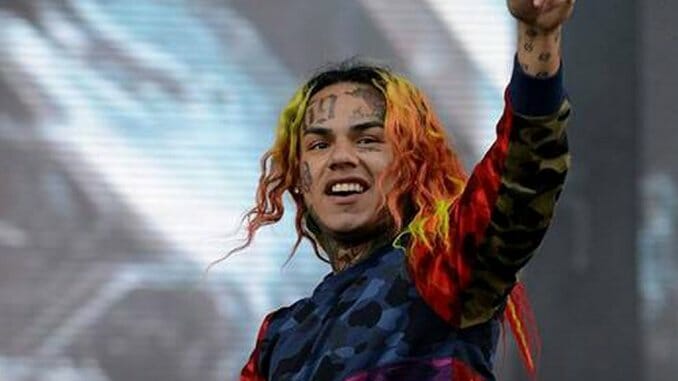69: The Saga of Danny Hernandez Half-Heartedly Investigates Rap’s Clown Prince of Grime
Photos Courtesy of Showtime
Tekashi69 is the Jackass of rappers. Physical shock value gets you in the door and, once you’re in, you either start unpacking what’s underneath or simply sit back and enjoy the self-destruction. The rodeo clowns hitting each other in the balls and the delivery-boy-turned-rapper with the rainbow hair, face tattoos, and DIY clothing printed with profanity have one attention-seeking goal in mind. “What I saw from him from the gate is that he’d do whatever to be famous,” says rapper Bodega Bamz in Hulu’s documentary 69: The Saga of Danny Hernandez. The problem isn’t that the film is as shallow as its subject, but that its efforts to find substance beyond the style are handicapped by its broad format.
Directed by Vikram Gandhi (Barry) and released without marketing fanfare straight to the streaming service, 69 stops being the story of Danny Hernandez relatively quickly. Interviews with Sara Molina, the mother of his daughter and survivor of his domestic abuse, give a glimpse into his life before the image, but the doc spends most of its time on the same sensational highlights as the headlines as it chronologically tracks the rapper’s career from the bodega to Billboard.
This is partially because, the film argues, the line quickly disappeared between Hernandez and his ridiculous, violent, over-sexed rap persona (something that FX’s Dave had sharp commentary on earlier this year). The manic rapper tries to evoke The Dark Knight’s Joker during one of his music videos, but by all accounts he’s more of Joker’s version of the Batman villain: he’s not here with a plan to see the world burn, he’s here with nothing but the need for attention. But this isn’t a superheroic effort to understand him.
Assembled with new interviews and a flood of archival footage—the good thing about making a doc about someone that won’t appear in your film is that if they owe their fame to Instagram and Vine, there’s plenty of video out there—69 is surprisingly (ahem) by-the-numbers considering its bombastic subject matter. Aside from opening titles emblazoned upon a tattooed body, it tries to shove elements that are purposely sensational into a toned-down investigative-style doc. Things like Gandhi’s simple narration and traditional aesthetic (slow pans over court documents, basic needle drops like “In the Hall of the Mountain King” to show something spiraling out of control) clash so strongly with the bleeding edge multimedia rap game as to undermine its commentary.
-

-

-

-

-

-

-

-

-

-

-

-

-

-

-

-

-

-

-

-

-

-

-

-

-

-

-

-

-

-

-

-

-

-

-

-

-

-

-

-








































